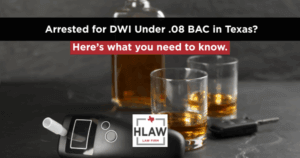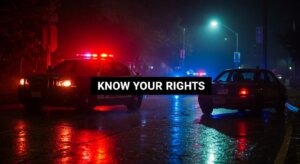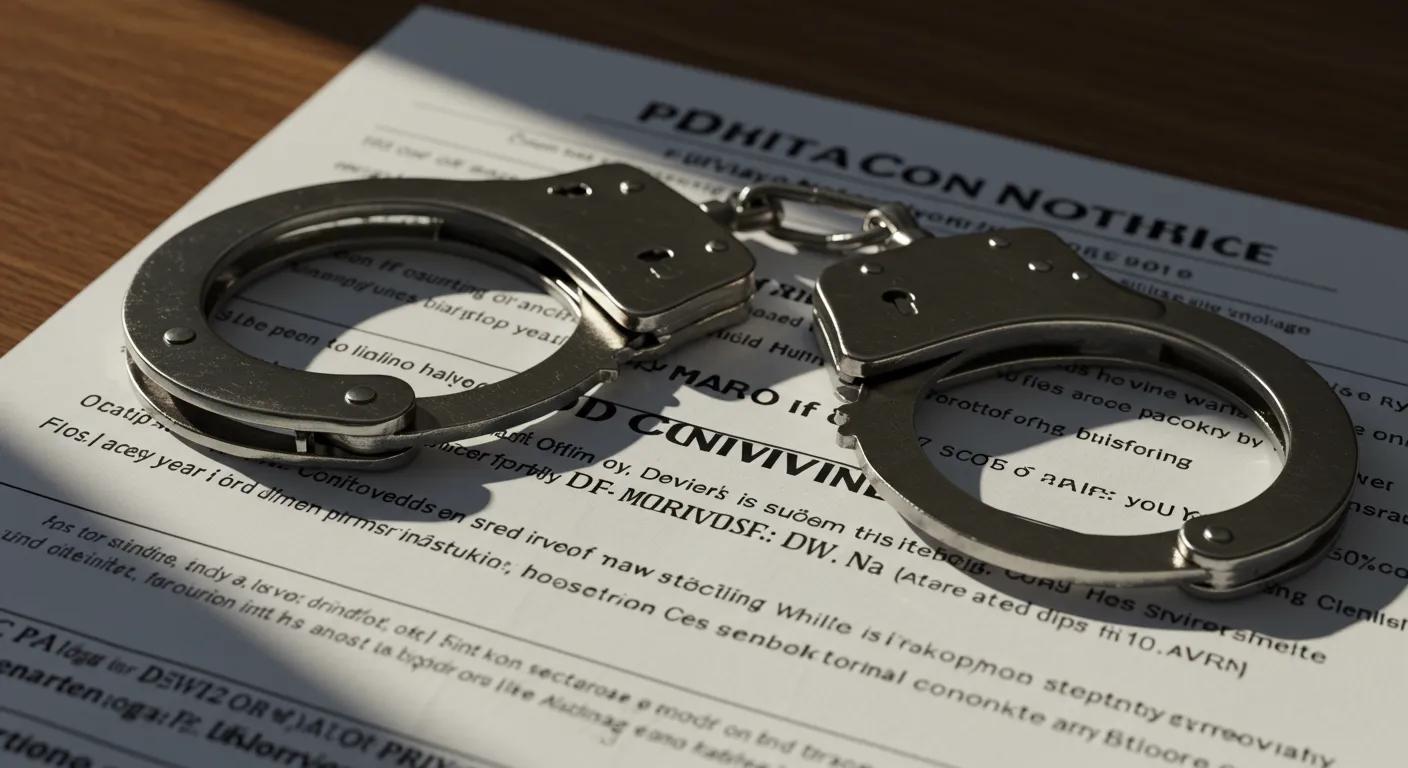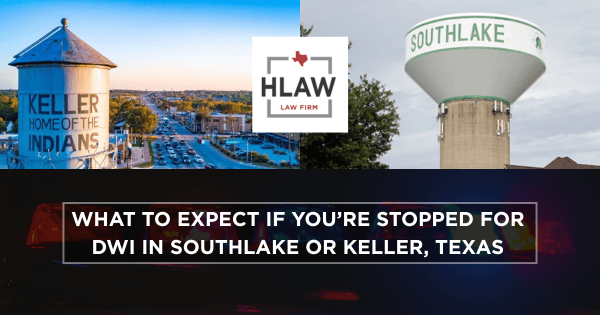
Texas law allows for DWI arrests even with a BAC under .08. Find out what this means for you and how to protect your rights.
Getting arrested for DWI when your BAC (Blood Alcohol Concentration) is actually under the legal limit of .08 can be incredibly confusing and even scary. But don’t worry, understanding your rights and defense options can bring a lot of clarity. This guide, put together with insights from our experienced attorneys, will walk you through how Texas defines intoxication beyond just a BAC number, how officers try to prove impairment, the tricky parts of field sobriety and chemical tests, your legal protections during a stop, potential penalties, and why having an experienced DWI tips team on your side is absolutely essential for a better outcome.
Understanding your rights is crucial when facing DWI charges below the legal BAC limit.
Can You Really Be Charged With DWI Even If Your BAC Is Below .08?
Yes, you absolutely can! In Texas, you can face DWI charges even if your BAC is under .08. Why? Because intoxication isn’t just about a number; it’s also about losing the normal use of your mental or physical faculties. In these cases, police officers need to show that you were impaired through their observations or tests. This means they could charge you for noticeable impairment, no matter what your measured alcohol concentration was. Grasping this fundamental legal point is key to building a strong defense and protecting yourdriving privileges.
Intoxication in Texas isn’t solely defined by a BAC number, but also by the loss of normal faculties.
What Does “Intoxication” Mean Beyond Just Your BAC?
Texas Penal Code§49.01(2) defines intoxication in two ways: either you’ve lost the normal use of your mental or physical faculties because of alcohol or drugs (regardless of your BAC), OR you have an alcohol concentration of .08 or more. This “dual definition” is super important. It means someone with a BAC as low as .05 could still be considered intoxicated if their driving, speech, coordination or other observable signs clearly show impairment. This definition can be highly subjective, yet legally binding.. Understanding this difference is paramount for any effectivelow BAC DWI defense strategy.
In Texas, intoxication is about losing your normal faculties, not just a BAC number.
How Do Officers Establish Probable Cause? The Role of FSTs (Field Sobriety Tests)
Officers are trained to meticulously observe your driving behavior, roadside interactions, and field sobriety tests (FSTs) to infer impairment and establish probable cause for an arrest. They can do this even if a breath or blood test later shows your BAC is below .08. Things like erratic driving, red and bloodshot eyes, the smell of alcohol, or fumbling for your documents all contribute to their assessment. FSTs are designed to check your coordination, balance, and ability to multitask, giving them evidence of impairment for charges based on your faculties.

Challenging Field Sobriety Tests in Low BAC Cases
Field Sobriety Tests are a big tool for officers, but their administration can definitely be challenged.
While officers are supposed to follow standardized procedures for FSTs, mistakes in how they give instructions, time the tests, or even score them can completely undermine their validity. Here’s a quick look at the main roadside evaluations and where they can go wrong:
Standardized Field Sobriety Tests (SFSTs) have faced a lot of scrutiny over how reliable they actually are, with some studies even pointing to significant error rates. This potential inherent unreliability is often a cornerstone of many successful DWI defenses. Errors like improper instructions, erroneous administration, or even environmental obstacles can invalidate FST results, poking holes in the prosecution’s story of noticeable impairment. Remember, refusing voluntary field sobriety tests doesn’t trigger statutory refusal penalties, though it might make an officer more suspicious. Your legal counsel can rigorously attack FST evidence by highlighting training gaps, environmental interferences, and subjective scoring biases, often leading to favorable outcomes.

How Accurate Are Chemical Tests? And What Can Affect Them?
When BAC levels are lower, chemical tests could be much more prone to error due to how sensitive the machines are, various physiological factors, and even the sampling techniques used. Many different things can skew the readings, which often presents critical defense opportunities. The accuracy of chemical tests, especially at lower BAC levels, can be influenced by many factors. These include:
- Machine Calibration – If machines aren’t maintained or calibrated properly, it can lead to consistent errors, making the results unreliable.
- Mouth Alcohol – Things like recent belching, vomiting, or even using mouthwash can artificially inflate breath readings, leading to false positives.
- Physiological Variations – Your body temperature, hematocrit levels, and certain medical conditions can all alter how alcohol is absorbed and metabolized, impacting accuracy.
- Sampling Technique – Poor or improper blood draws, improper storage, or contaminated vials can compromise the sample’s integrity, potentially making the results inadmissible.
Onesignificant investigationeven revealed that breath test devices frequently give inaccurate readings due to systemic issues like improper calibration, human error, and a severe lack of oversight in device maintenance, with some machines reporting results up to 40% too high!
Chemical tests, especially at lower BAC levels, can be susceptible to various factors affecting their accuracy.
Rising BAC & Medical Defenses
The “rising BAC” defense argues that alcohol you drank before driving might still be absorbed into your bloodstream after you’ve been stopped. This could lead to a higher BAC reading at the time of the test than you actually had while driving. By showing post-stop absorption curves through expert testimony, attorneys can demonstrate that a breath or blood test might overstate your impairment at the time of operation. Plus, medical issues like gastroesophageal reflux, diabetes, or unusual metabolism can mimic or mask alcohol presence, potentially producing false positives. Presenting thorough medical evidence helps defense teams challenge the accuracy of chemical tests and raise reasonable doubts.
Common Legal Defenses Against Chemical Test Evidence
When it comes to challenging chemical test results, defense strategies usually involve a multi-pronged approach:
- Contesting the machine’s maintenance and calibration records, demanding full transparency.
- Showing that there were procedural violations in how the sample was collected, stored, or analyzed.
- Bringing in expert testimony about physiological differences and how they impact readings.
- Using independent blood sample retesting by accredited laboratories to either confirm or refute the initial findings.
Your Rights During a DWI Stop & Arrest
Knowing your legal protections is incredibly important. It helps you navigate roadside interactions, minimize self-incrimination, and protect your defense. Under Texas’s implied consent laws, driving on public roads means you automatically agree to chemical testing, and refusing it can lead to an automatic license suspension and fines. However, you do have the right to remain silent and can politely decline to perform voluntary sobriety exercises. You should also invoke your right to counsel immediately after an arrest. Getting a qualified DWI defense attorney involved early ensures that evidence is properly preserved, administrative hearing requests are made on time, and you get strategic guidance through every legal step.
Understanding and asserting your rights is critical during a DWI stop.

Protecting Your Driver’s License
In most instances, you can request an administrative license revocation (ALR) hearing within 15 days of your arrest to fight the suspension. Presenting strong arguments about test refusal, procedural errors, or a lack of probable cause might help you keep your driving privileges during the prosecution, significantly reducing the impact on your job and daily life.
Can You Be Charged With DWI in Texas If Your BAC Is Below .08?
Penalties & Long-Term Consequences of a Low BAC DWI
Even with a low BAC, DWI convictions come with serious fines, potential jail time, and lasting consequences that go far beyond the courthouse, affecting your life for years. Penalties get much steeper if you have prior offenses or if impairment is clearly proven, as you can see below. It’s crucial to remember that a lower BAC doesn’t prevent you from facing full statutory penalties if impairment is proven, so understanding these ranges really highlights the urgency of building a strong defense.
DWI convictions carry severe and lasting consequences, regardless of your BAC level.

How It Impacts Your License, Insurance, & Employment
A conviction means you may need SR-22 insurance, get significant points on your driving record, and face possible substantial premium hikes. License suspensions make travel and employment challenges even worse, often requiring expensiveignition interlock devices for reinstatement, which creates a long-term financial burden. A DWI conviction can show up on background checks for life, potentially disqualifying you from jobs that require clean driving records or security clearances. And if you’re a repeat offender, you’ll face dramatically higher fines, longer jail sentences, and extended license revocations.
How a DWI Defense Attorney Can Really Help You
In low BAC DWI cases, having specialized legal representation isn’t just helpful; it’s absolutely essential. You’ll want counsel with a proven track record and specific expertise, including:
- Demonstrated experience in low BAC and impairment-based DWI defense, understanding all the unique nuances.
- In-depth knowledge of Texas Penal Code §49.01 definitions and how they apply in court.
- A strong track record of successfully challenging field sobriety and chemical test results.
- Exceptional negotiation skills for plea agreements or alternative sentencing, and formidable trial advocacy.
A specialized DWI defense attorney is indispensable for navigating the complexities of low BAC cases.
Challenging Probable Cause & Improving Outcomes
Defense lawyers can file motions to suppress evidence based on a lack of reasonable suspicion, improper FST administration, or faulty chemical test procedures. They might depose arresting officers, subpoena maintenance and/or blood testing records, and sometimes bring in expert witnesses to dismantle the prosecution’s proof of impairment. Getting an attorney involved early preserves critical evidence, secures administrative hearing dates, and prevents costly procedural missteps, dramatically improving your chances of a favorable outcome.
The Process for Hiring a DWI Defense Lawyer
- Initial Consultation – This is a critical first step to review your arrest details and initial evidence.
- Engagement Agreement – A clear outline of what the representation covers and the associated fees.
- Case Evaluation – A thorough assessment to pinpoint strengths, weaknesses, and the best defense angles.
- Formal Representation – Your attorney files motions, negotiates with prosecutors, and represents you at all hearings and trial, providing unwavering advocacy.
Facing a Low BAC DWI Charge? Don’t Wait!
The complexities of low BAC DWI cases demand immediate and expert legal intervention. Protect your rights, your license, and your future by consulting with a dedicated defense attorney today.
At Howard Lotspeich Alexander & Williams, PLLC (HLAW), our DWI attorneys are among the most respected in North Texas for their skill, experience, and results. We understand that a DWI arrest can threaten your freedom, reputation, and future — and we treat every case with the precision it deserves. Our lawyers are former prosecutors and seasoned trial advocates who know how to challenge field sobriety tests, breath or blood results, and every aspect of the state’s evidence. Whether it’s a first-time offense or a felony DWI, we bring a proven track record of dismissals, reductions, and victories in court — all backed by our firm’s commitment to compassion and preparation..
Schedule Your Free Consultation
Ready to Discuss Your Case?
Don’t face a low BAC DWI charge alone. Our experienced attorneys are here to provide the expert legal defense you need.
Why Choose Our Firm for Your Low BAC DWI Defense?
When your future is on the line, you need more than just legal representation—you need a dedicated advocate with a proven track record. Our firm specializes in low BAC DWI cases, truly understanding the intricate legal landscape and the scientific nuances needed to build an impenetrable defense. We offer:
- Unmatched Expertise: Deep knowledge of Texas DWI law, including that subjective “loss of faculties” definition.
- Strategic Defense Planning: Tailored strategies, from rising BAC defenses to medical condition arguments.
- Client-Centered Advocacy: Protecting your rights, license, and future with unwavering dedication.
- Aggressive Evidence Challenge: Meticulous scrutiny of FSTs, breathalyzer calibration, and blood test protocols.
Immediate Steps After a Low BAC DWI Arrest
Taking proactive steps right after an arrest is essential and can really strengthen your defense by preserving crucial evidence and effectively asserting your rights. Immediately record the date, time, location, officer names, any witness contacts, and your own detailed notes on road conditions and officer statements. If you initially refused, request independent blood testing within hours at a certified lab to get objective data. Filing an ALR hearing request within 15 days of arrest may be necesary to challenge evidence, refusal grounds, or probable cause. And make sure to work closely with your attorney to gather all relevant medical records, expert reports on test accuracy, and witness statements.
Key Takeaways from Legal Experts
- Intoxication Isn’t Just a Number: Texas law defines intoxication by “loss of normal mental or physical faculties,” meaning you can be charged even if your BAC is below .08.
- Challenge Every Piece of Evidence: Field sobriety tests and chemical tests are prone to errors. A skilled attorney will scrutinize how they were administered, calibrated, and any physiological factors.
- Know Your Rights: You have the right to remain silent and should ask for legal counsel immediately after an arrest. Refusing voluntary FSTs isn’t penalized like refusing chemical tests.
- Consequences Are Severe: Even low BAC DWI convictions come with significant fines, jail time, license suspensions, and long-term impacts on your employment and insurance.
- Expert Legal Counsel is Indispensable: A specialized DWI defense attorney is crucial for navigating the complexities, challenging evidence, and securing the best possible outcome.
Being arrested for DWI below the legal BAC limit definitely calls for specialized legal defense and consultation to protect your rights and driving privileges. By understanding the nuanced definitions of impairment, rigorously challenging test reliability, asserting your rights during stops, and enlisting experienced counsel, you can navigate this complex legal process with confidence and pursue the best possible outcome. If you’re facing a low BAC DWI charge in Texas, don’t delay—seek a qualified DWI defense attorney today to start building your robust defense strategy and protect your future.
About the Author
Jason H. Howard is a seasoned trial attorney based in Fort Worth, Texas, dedicated to defending clients in criminal and DWI matters. Before entering private practice, he served as a felony chief prosecutor in the Lubbock County Criminal District Attorney’s Office, gaining extensive courtroom experience on both sides of the aisle. Jason focuses his practice entirely on litigation, with a special concentration in DWI / intoxication offenses, criminal defense, and personal injury. Over his career, he has handled more than a thousand cases from start to finish and has earned recognition as one of Fort Worth’s Top Attorneys and a “Super Lawyer” from Thomson Reuters. Raised in small-town West Texas, Jason brings both legal skill and a grounded sense of purpose to his work. Outside the courtroom, he enjoys fly fishing, time outdoors, and serving his community and church.










